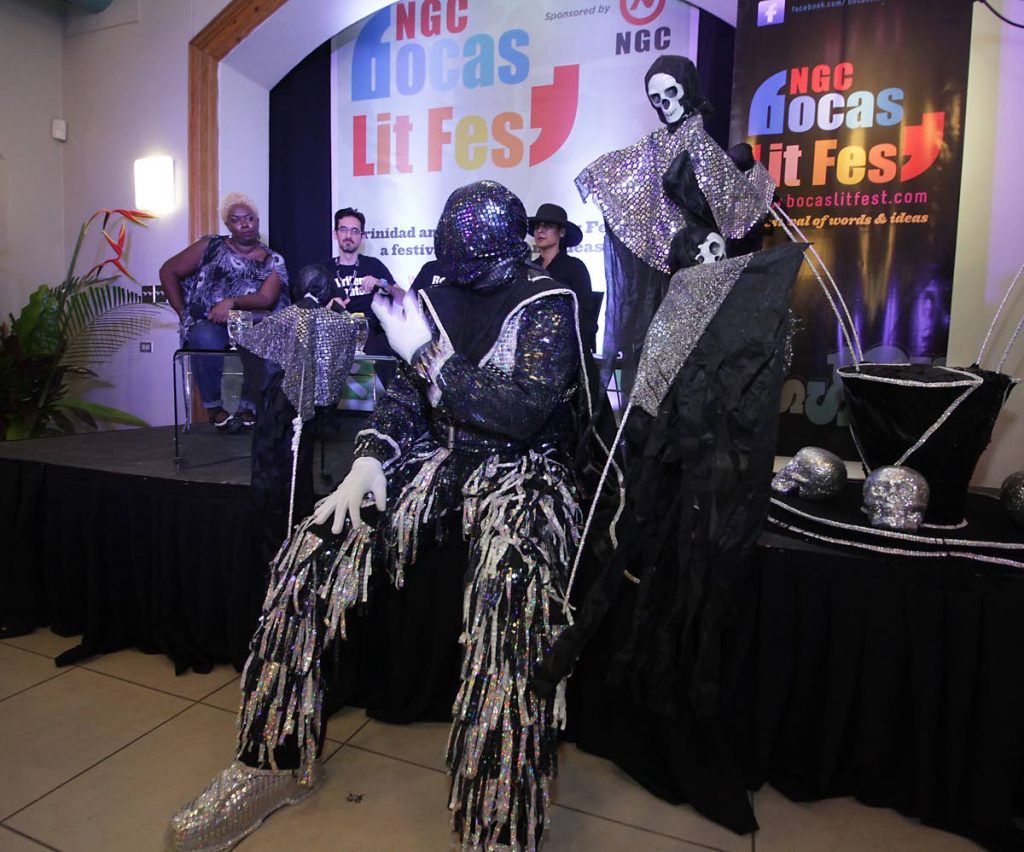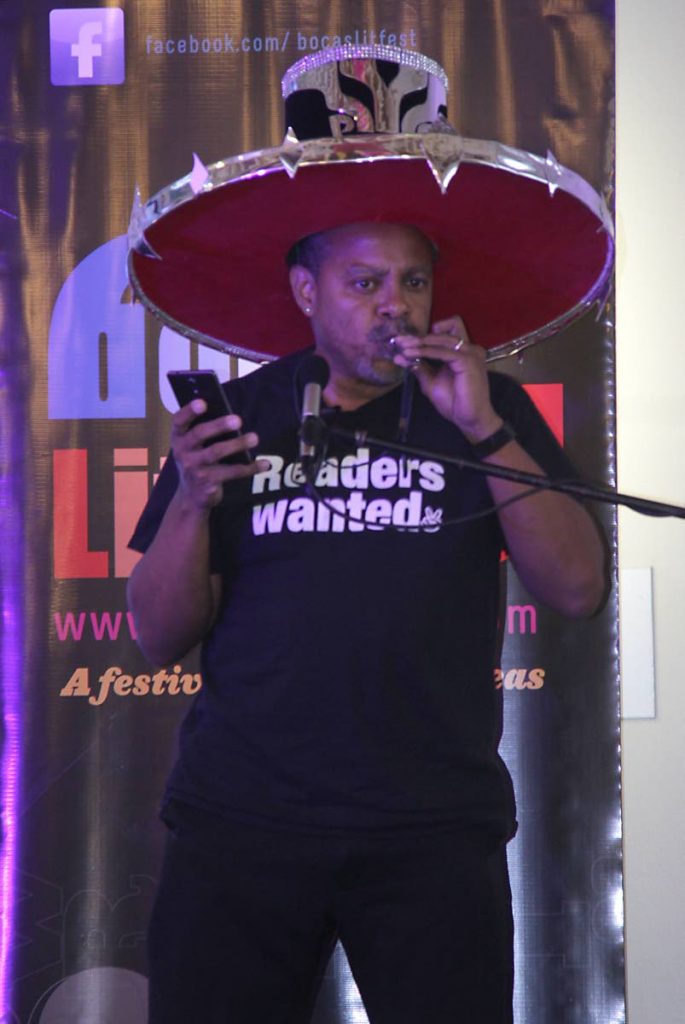Midnight robbers stalk Bocas

SHEREEN ALI
THREE writers – Vahni Capildeo, Rhoda Bharath and Colin Robinson – took to the stage as novice robbers in an unusual session at the recently concluded Bocas Lit Fest. Their daunting task: to terrify and entertain an audience with their own attempts as midnight robbers.
The midnight robber is a sinister male character in TT folk Carnival traditions who stalks the land giving ranting tirades while boasting of his universal, deadly prowess, defying all mocking pretenders and rivals. He is an agent of both rebellious resistance and massive egotism.
The character likely evolved in Trinidad from several influences, including the West African griot/storyteller tradition brought here by the slave trade; legends of Wild West cowboy-era America, rife with outlaws who terrorised the establishment; and the rise of Penny Dreadfuls in 19th-century England, the precursor to comics, which were weekly, cheap publications of sensational, macabre stories about the exploits of detectives, criminals, or supernatural entities.

Another influence might have been the braggadocio of bad-boy heroes in western films, very popular in Trinidad cinemas.
And the underground, historical ex-slave rage at injustice and desire for revenge also fed into it, giving rise to the whole idea of the dark, mysterious, masqueraded midnight robber exacting spectacular vengeance on a wicked, cruel and unfair world, while scaring you out of your money.
Veteran midnight robber Damian Whiskey explains on his website that in TT mythology, a midnight robber “is usually born in an uninhabitable remote location, his birth in itself is an abomination, he is the son or grandson of a famous villain who is encouraged to pursue the family tradition.”
A young robber, says Whiskey, perfects his talents in isolation through dastardly acts such as robbing banks, murdering people, and amassing a stockpile of treasures, while having amazing or supernatural powers such as the ability to drown someone in a teaspoon of water.
Whiskey opened last Thursday’s Bocas Robber Talk session, sweeping into the room, negotiating a cramped performing space and ducking the Chinese lanterns that threatened to entangle his magnificently gigantic black hat. Sprouting sparkling silver skulls in four directions, the wide-brimmed hat crowned his look as a harbinger of death and destruction. He blew his police whistle and began:
“Greetings in the name of the great Digital Divide,
The connected, interconnected, disconnected and reconnected,
I am the great and omnipresent Midnight Tech,
The victor, dictator, and merciless leader of the real, the unreal, the virtual, the subliminal,
Of everywhere and nowhere.”
“From the ballpoint pen to the microchip, to the calculator and the rocket ship,” this midnight tech robber claimed to “control your thoughts and social behaviour.” He was commenting on the pervasive, insidious grip of communications technology on contemporary behaviour and received loud applause.
Rhoda Bharath next performed, dressed in a flowing black-and-white peacock-feather-patterned blouse and sporting a short-cropped, curly blonde hairstyle. Bharath is a writer, teacher, and political/cultural blogger whose debut book The Ten Day’s Executive and Other Stories was published by Peepal Tree Press in 2015. Her piece, “#dunce trending,” was about the stupid toxicity of people who misuse social media and pervert their higher thought processes by sharing fake news, lies and malicious gossip.
She began with her midnight robber’s own creation story:
“I was not born, I was manifested
Brought into being by a commitment to ignorance so deep-seated
That I am a constipation of galaxies that dove past the
depths of the Marianna Trench
Plunged into the abyss of time, surfed past the earth’s molten core
Dodged the imaginative sparks of creation
And tore a hole into the womb of the mind
which led to the toxic haemorrhaging
that miscarried me into the world that was yet to be formed
An endometrial womb ripe with tumours
That oozed and leaked fluids and gases so sulphurous and acidic
that anything prolific was neutered by it.
My gestation period was as fleeting as the semblance of a thought
Quicker than the leap across a synapse
But my life will span aeons.
My name is Dunce.”
Next up was Colin Robinson, who threw himself into the role with a blow of a whistle and a big red robber hat. Robinson is a Newsday columnist, activist, essay-writer and poet. He is executive director of CAISO, the Coalition Advocating for Inclusion of Sexual Orientation, formed in 2009 to lobby for equal rights for people of diverse sexual orientations and gender identities. His debut poetry collection You Have You Father Hard Head was published in 2016.
He began his robber talk in a measured, quiet, slyly ominous tone:
“Stop and bow and give pleasure
I am the darkness of freedom, the bastard of Lot
The grandson and horn chile of Ham
I am Caliban lagniappe,
I have the whip to suck salt out your pillar of wounds.”
His robber talk was most interesting, although rather quietly presented.
A piercing shriek announced the last robber of the evening, Vahni Capildeo, who named her own midnight robber character Stranger Invader, inspired by a line from the Martin Carter poem This is the Dark Time, my love.

Capildeo is an award-winning Trinidadian-British poet who studied translation theory and Old Norse. Her books include No Traveller Returns (2003), Person Animal Figure (2005), Undraining Sea (2009), and Measures of Expatriation (which won the 2016 UK Forward Best Collection Prize). Her most recent book is Venus as a Bear (2018).
Capildeo credits three people with helping her to craft her own robber talk for Bocas: the masterful ecological midnight robber Johnny Stollmeyer, known as King Cobo; midnight robber Fedon Honoré, who taught her about the psychology, history and speech style of the midnight robber; and finally, her mother. Leila Bissoondath Capildeo, who grew up in Sangre Grande and who told her daughter dramatic stories of the traditional masqueraders she remembers from the 1940s and 1950s there.
After her blood-curdling scream, Capildeo began:
“Halt! Make way for the Stranger Invader. I am the darkness that invades your mind. You are the darkness that is mine.
In the time when allyuh gods was a mist kissing the a--e of the black water that covered the face of the world with all the green dolor, I was the astronomical anti-matter.
Where the angels glide and collide with me, I smash up the angels to eternity.
Before the earth rise up as God’s son and daughter, I dry up God’s tears and eat up their laughter.
I was the hurt that hobble the angel foot. I was the rot that spread in the forest’s root.”
Stranger Invader’s words rippled with violent firebombs of many kinds, stunning the audience into a paralysis of silence while they took in her wide-ranging powers of evil:
“I am the error that recurs to infinity!” she warned us.
“Tremble before me, the Stranger Invader! I take every shape and no shape. I am obstacle everlasting that tricks those who want to be free.”
And later:
“I am the Gramoxone love song at the wedding of the doctor,
I am the child bride hymen beneath the fingernails of the lawyer,
I am the coat hanger in the cupboard of the priest wife room,
I am the terrorist vampire from the Lapeyrouse tomb.
I erase your face where you seeing race.
There is nowhere to hide because I am inside you at a cellular level,
splitting your atoms in a nuclear evil…”
Stranger Invader’s parting shots revealed her shocking original sins in reverse time, to resounding applause from the audience.


Comments
"Midnight robbers stalk Bocas"